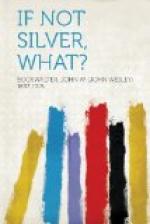=We want money that is equally good all over the world.=
There is no such money. The coin we send abroad is only bullion when it gets there, and most dealers prefer government bars. The exchange must be calculated exactly the same whether we use gold, silver, or paper in our domestic trade; and this notion that we “should be at a disadvantage in the exchange” is a delusion. The variations in the value of the greenback during our war era were calculated daily, and prices in this country rose or fell to correspond. It must, I say, be calculated just the same in gold or silver, and any smart schoolboy can do it in a minute on any transaction.
=What I mean is that the silver dollar is worth only 50 cents in gold.=
And by the same token the gold dollar is worth 200 cents in silver. The answer is as logical as the quip, and neither is worth notice. Such a process merely assumes an arbitrary standard and measures all other things by it, as the drunkard in a certain stage of intoxication thinks that his company is drunk while he is duly sober. And, by the way, where do you get your moral right to say that a dollar which will buy two bushels of wheat or twenty pounds of cotton is any more honest than one which will buy one bushel or ten pounds? Is it because with the dear dollar the farmer must work twice as long to pay off a mortgage, that the interest paid on the great debts of the world will buy twice as much, and the debtor nations are put at a terrible disadvantage as to the creditor nations personally? Is that honest?
A very safe test of any theory is to follow it to its logical conclusion. Take your “honest” money argument, on the basis of twenty years’ experience, and see where it will take you in the near future. The dollar which buys two bushels of wheat or sixteen pounds of cotton is “honest,” you say, and a dollar which buys but one bushel or eight pounds is not. By and by, if your fallacy prevails, the dollar will buy three bushels of wheat or twenty-five pounds of cotton, and will then, by your reasoning, be much more “honest” than now. Is that your idea? How much lower must prices go before you will admit that gold has gained in purchasing power?
=But it cannot be that prices have fallen because of the scarcity of money, for the low rate of interest now prevailing proves that money is abundant and cheap.=
That is a very old fallacy, and a singularly tenacious one, as it seems that no amount of experience drives it from the minds of men. Look over the history of our panics and you will find that after the first convulsion is past the banks are soon crowded with idle money, and the rate of interest falls. Take notice, however, that the money lenders always declare that they must have “gilt-edged paper.” Interest on first-class securities is never lower than in the hardest times which follow a particularly severe panic, and the reason is obvious: all far-seeing business men know that prices are likely




